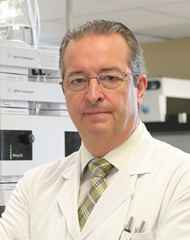"To think that vaccines are not going to be safe would be a complete mistake."
Before the start of the campaign in the United Kingdom, Dr. José Ramón Azanza reminds us that vaccines are evaluated in more than 40,000 individuals while drugs are evaluated in less than 5,000.

PHOTO: Manuel Castells
According to Dr. José Ramón Azanza, an expert in Pharmacology at the University of Navarra, "any new drug is marketed after its assessment in less than 5,000 individuals and with treatments of short duration. This contrasts with the experience with vaccines: with between 40,000 and 60,000 subjects and applied at the end of several months of follow-up. This is why it is a complete mistake to describe vaccines as unsafe". The specialist intervened in a session at training on treatments against COVID-19 organized by the School of Nursing of the academic center.
Regarding the start of vaccination in the United Kingdom this week, the expert considers that its origin "is to be found in the BREXIT, since this country is now autonomous in making decisions that, until this year, were made by the European Medicines Agency for all EU countries". Likewise, in relation to the data that can be obtained from this start of vaccination, Azanza believes that "it is very unlikely that they will modify, at least in the first few months, the current scientific information on its safety and efficacy, which are very positive".
In this online session -second in a series of free talks for healthcare professionals promoted by the School de Enfermería- Dr. Azanza recalled that great progress has been made in the knowledge of the functioning of many therapeutic measures for the treatment of COVID: "Today, moreover, we know the real usefulness of many of them. Some are more useful than others and there is a issue pending to know their results. We are generating a huge Issue of medical information, with more than 77,000 articles, of which around 2,000 are devoted to treatment. And more than 800 on vaccines alone".
At least six vaccines starting in JanuaryAs to whether vaccines will be the solution, the Pharmacology professor considers that in January there will be at least 6 vaccines available, "they will be vaccines with different mechanisms, with different administration conditions and which will require different measures from the administrations for their conservation. In any case, this should not worry the population". "What is relevant is their broad efficacy -above 90%, provided they are used as it seems in two doses separated by 4 weeks- and that the population called to do so, according to the instructions of the authorities, is vaccinated as soon as possible. Only in this way will we be able to overcome the problem with the solvency it requires," the expert emphasizes.
Regarding administration through primary care teams, the expert considers that "it is a good way to go. These teams manage these situations very well and over time, as experience progresses, perhaps it can be delegated to other bodies such as the medical teams at work in large companies".
"Is the vaccine a solution?" is the second online session in a series of specific training sessions aimed at students, alumni and healthcare professionals organized by the University of Navarra's School Nursing Department.
